| Listing 1 - 10 of 13 | << page >> |
Sort by
|
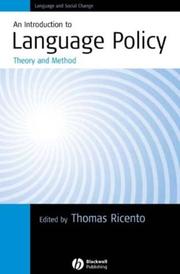
ISBN: 9781405114981 9781405114974 1405114975 1405114983 9786611214593 1281214590 1405144629 Year: 2006 Volume: 1 Publisher: Malden Blackwell
Abstract | Keywords | Export | Availability | Bookmark
 Loading...
Loading...Choose an application
- Reference Manager
- EndNote
- RefWorks (Direct export to RefWorks)
An Introduction to Language Policy: Theories and Method is a collection of newly-written chapters that cover the major theories and methods currently employed by scholars active in the field. provides an accessible introduction to the study of language policy research and language's role in social life consists of newly commissioned essays written by internationally recognized scholars helps define and describe a growing field of inquiry and is an authoritative source for students, scholars and researchers in linguistics, applied linguistics, education, policy studies and related areas includes section overviews, annotated chapter bibliographies, and discussion questions
Language policy. --- Sociolinguistics --- Language policy --- Glottopolitics --- Institutional linguistics --- Language and languages --- Language and state --- Languages, National --- Languages, Official --- National languages --- Official languages --- State and language --- Government policy --- Communication policy --- Language planning
Book
ISBN: 8772898682 8763505274 9788763505277 Year: 2006 Publisher: Copenhagen, Denmark : Museum Tusculanum Press,
Abstract | Keywords | Export | Availability | Bookmark
 Loading...
Loading...Choose an application
- Reference Manager
- EndNote
- RefWorks (Direct export to RefWorks)
Today, English is the predominant foreign language in Denmark and it is so widely spread that many people are concerned for the Danish language. But this is a recent development. As late as a hundred years ago, one could pass one's A-levels without ever having read a single word of English, and even students of the science side were taught more Latin than students of the Classical languages are today. It was the school reforms in 1903 that broke away from the grammar school and gave the modern languages a key position in both the primary, lower secondary and upper secondary schools. From having been scorned as a language of commerce, English was now recognized as a valid cultural language. The book outlines this development and discusses questions, such as: Why did it take so long for the English language to become part of the general education? What connected the Danish political-cultural orientation after 1964 and the development of the language subjects in the schools? Why was the school of Modern languages successful at first when later, in the 1930s, it came up against an identity crisis? The book provides a historical perspective for the topical debate in the upper secondary schools and proves that many of the arguments in this debate have been heard before.
Language policy --- English language --- Germanic languages --- Glottopolitics --- Institutional linguistics --- Language and languages --- Language and state --- Languages, National --- Languages, Official --- National languages --- Official languages --- State and language --- Communication policy --- Language planning --- Study and teaching --- Government policy
Book
ISBN: 1920109714 Year: 2006 Publisher: AFRICAN SUN MeDIA
Abstract | Keywords | Export | Availability | Bookmark
 Loading...
Loading...Choose an application
- Reference Manager
- EndNote
- RefWorks (Direct export to RefWorks)
Sociolinguistics --- Language policy --- Glottopolitics --- Institutional linguistics --- Language and languages --- Language and state --- Languages, National --- Languages, Official --- National languages --- Official languages --- State and language --- Communication policy --- Language planning --- Government policy --- Language and culture --- Linguistics --- Sociology --- Integrational linguistics (Oxford school)
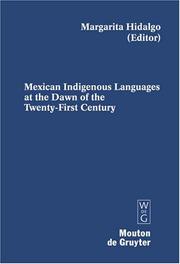
ISBN: 1282194046 9786612194047 3110197677 3110185970 9783110185973 9783110197679 Year: 2006 Volume: 91 Publisher: Berlin New York Mouton de Gruyter
Abstract | Keywords | Export | Availability | Bookmark
 Loading...
Loading...Choose an application
- Reference Manager
- EndNote
- RefWorks (Direct export to RefWorks)
This volume explores the reversing language shift (RLS) theory in the Mexican scenario from various viewpoints: The sociohistorical perspective delves into the dynamics of power that emerged in the Mexican colony as a result of the presence of Spanish. It examines the processes of external and internal Indianization affecting the early European protagonists and the varied dimensions of language shift and maintenance of the Mexican colonial period. The Mexican case sheds light upon language contact from the time in which Western civilization came into contact with the Mesoamerican peoples, for the encounter began with a demographic catastrophe that motivated a recovery mission. While the recovery of Mexican indigenous languages (MIL) was remarkable, RLS ended after fifty years of abundant productivity in MIL. Since then, the slow process of recovery is related to demographic changes, socioreligious movements, rebellion, confrontation, and survival strategies that have fostered language maintenance with bilingualism and language shift with culture preservation. The causes of the Chiapas uprising are analyzed in connection with the language attitudes of the indigenous peoples, while language policy is discussed in reference to the new Law of Linguistic Rights of the Indigenous Peoples (2003). A quantitative classification of the MIL is offered with an overview of their geographic distribution, trends of macrosocietal bilingualism, use in the home domain, and permanence in the original Mesoamerican settlements. Innovative models of bilingual education are presented along with relevant data on several communities and the philosophies and methodologies justifying the programs. A model of Mazahua language use is presented along the Graded Intergenerational Disruption Scale.
Angewandte Linguistik. --- Indians of Mexico. --- Indians of Mexico --- Language and culture --- Language policy --- Languages. --- Glottopolitics --- Institutional linguistics --- Language and languages --- Language and state --- Languages, National --- Languages, Official --- National languages --- Official languages --- State and language --- Culture and language --- Government policy --- Communication policy --- Language planning --- Culture --- Languages --- Mexico --- Mexico /languages. --- language contact. --- sociolinguistics.
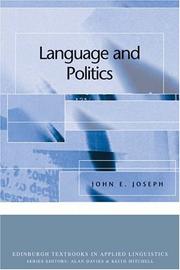
ISBN: 074862452X 0748624538 9780748624539 9780748624522 9780748626977 9786610501649 0748671455 1280501642 0748626972 9780748671458 6610501645 9781280501647 Year: 2006 Publisher: Edinburgh Edinburgh University Press
Abstract | Keywords | Export | Availability | Bookmark
 Loading...
Loading...Choose an application
- Reference Manager
- EndNote
- RefWorks (Direct export to RefWorks)
Language, this book argues, is political from top to bottom, whether considered at the level of an individual speaker's choice of language or style of discourse with others (where interpersonal politics are performed), or at the level of political rhetoric, or indeed all the way up to the formation of national languages. By bringing together this set of topics and highlighting how they are interrelated, the book will function well as a textbook on any applied or sociolinguistic course in which some or all of these various aspects of the politics of language are covered. The chapter headings include: *How politics permeates language (and vice-versa) *Language and nation *The social politics of language choice and linguistic correctness *Politics embedded in language *Taboo language and its restriction *Rhetoric, propaganda and interpretation *Power, hegemony and choices
Language and languages --- Language policy. --- Langage et langues --- Politique linguistique --- Political aspects. --- Aspect politique --- Politics --- Sociolinguistics --- Language policy --- Political aspects --- Glottopolitics --- Institutional linguistics --- Language and state --- Languages, National --- Languages, Official --- National languages --- Official languages --- State and language --- Communication policy --- Language planning --- Government policy --- Language and languages Political aspects --- Language and languages - Political aspects --- Hommes politiques
Book
ISBN: 8484892166 3865278590 Year: 2006 Publisher: Madrid Iberoamericana
Abstract | Keywords | Export | Availability | Bookmark
 Loading...
Loading...Choose an application
- Reference Manager
- EndNote
- RefWorks (Direct export to RefWorks)
Language policy --- Linguistic minorities --- Sociolinguistics --- Language and languages --- Language and society --- Society and language --- Sociology of language --- Language and culture --- Linguistics --- Sociology --- Integrational linguistics (Oxford school) --- Minority languages --- Minorities --- Glottopolitics --- Institutional linguistics --- Language and state --- Languages, National --- Languages, Official --- National languages --- Official languages --- State and language --- Communication policy --- Language planning --- Social aspects --- Sociological aspects --- Political aspects --- Government policy --- Spain --- Languages. --- Minoritized languages
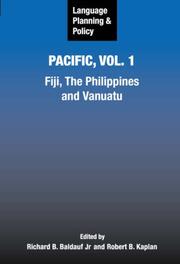
ISBN: 1280609680 9786610609680 1853599220 9781853599224 9781853599217 1853599212 Year: 2006 Publisher: Clevedon, [England] ; Buffalo : Multilingual Matters,
Abstract | Keywords | Export | Availability | Bookmark
 Loading...
Loading...Choose an application
- Reference Manager
- EndNote
- RefWorks (Direct export to RefWorks)
This volume covers the language situation in Fiji, The Philippines and Vanuatu explaining the linguistic diversity, the historical and political contexts and the current language situation, including language-in-education planning, the role of the media, the role of religion, and the roles of non-indigenous languages. The authors are indigenous and/or have been participants in the language planning context. Fiji and Vanuatu are not well represented in the international language policy/planning literature, while the section on the Philippines draws together the published literature in this area. The purpose of the volumes in this series is to present up-to-date information on polities that are not well-known to researchers in the field. A longer range purpose is to collect comparable information on as many polities as possible in order to facilitate the development of a richer theory to guide language policy and planning in other polities that undertake the development of a national policy on languages. This volume is part of an areal series which is committed to providing descriptions of language planning and policy in countries around the world.
Language planning --- Language policy --- Glottopolitics --- Institutional linguistics --- Language and languages --- Language and state --- Languages, National --- Languages, Official --- National languages --- Official languages --- State and language --- Communication policy --- Planned language change --- Sociolinguistics --- Government policy --- Planning --- Fiji. --- The Philippines. --- Vanuatu. --- language planning. --- language policy. --- linguistic diversity. --- non-indigenous languages.
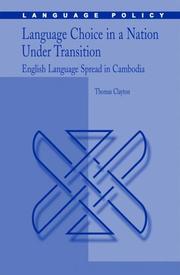
ISBN: 1280609478 9786610609475 0387311947 0387311939 1441940596 Year: 2006 Publisher: New York, NY : Springer US : Imprint: Springer,
Abstract | Keywords | Export | Availability | Bookmark
 Loading...
Loading...Choose an application
- Reference Manager
- EndNote
- RefWorks (Direct export to RefWorks)
This book examines language choice in contemporary Cambodia, and uses the case study to explore and evaluate competing explanations for the spread of English globally. Following the introduction, the multiple contexts in which Cambodians make individual and institutional language policy choices are considered. Chapters 2 and 3 examine the economic and political contexts for language choice, as Cambodia has transitioned from a planned economy and communism to a market economy and democracy. Chapters 4, 5, and 6 examine the assistance context for language choice; the bilateral, multilateral, and nongovernmental development agencies that have recently begun to work in Cambodia demand certain language skills of Cambodian employees and government counterparts, and support the learning of these languages in both nonformal and formal education. Individual and institutional languages choices Cambodians are making in economic, political, assistance, and educational contexts are described. Some Cambodians have chosen to learn French, making language policy decisions supportive of French language learning, in anticipation of education offered in French at universities locally and abroad. More Cambodians are studying and learning Chinese to procure jobs with firms owned or managed by Chinese speakers. A great many have chosen to learn English and to support English language learning in education. These decisions respond to the multiple demands and opportunities for employment with economic and assistance enterprises associated with virtually every nation or group of nations, for regional and international political communication, and for education in the global infrastructure of English-language universities. Having thus contextualized and described Cambodians’ contemporary language choices, the case study is applied to a theoretical debate in the field of language policy studies. The specifics of the Cambodian case fully confirm neither the "language choice" nor the "linguistic imperialism" explanation for the global spread of English. Rather, in Cambodia English is spreading as a result of both choice and promotion, it integrates with (though is not integral to) the contemporary global restructuring of the world, and has introduced results that, though aggregating toward amelioration, run the gamut from beneficial to exploitative for groups of Cambodians located variously along geographical, socioeconomic, ethnic, and other spectra. .
English language --- Language policy --- Germanic languages --- Glottopolitics --- Institutional linguistics --- Language and languages --- Language and state --- Languages, National --- Languages, Official --- National languages --- Official languages --- State and language --- Communication policy --- Language planning --- Government policy --- Language and languages. --- Language Education. --- Education, general. --- Sociology of Education. --- Foreign languages --- Languages --- Anthropology --- Communication --- Ethnology --- Information theory --- Meaning (Psychology) --- Philology --- Linguistics --- Language and education. --- Education. --- Educational sociology. --- Education and sociology --- Social problems in education --- Society and education --- Sociology, Educational --- Sociology --- Education --- Children --- Education, Primitive --- Education of children --- Human resource development --- Instruction --- Pedagogy --- Schooling --- Students --- Youth --- Civilization --- Learning and scholarship --- Mental discipline --- Schools --- Teaching --- Training --- Educational linguistics --- Aims and objectives --- Cambodia --- Languages.

ISBN: 1280611588 9786610611584 0387321861 1402045107 1461499925 Year: 2006 Publisher: New York, NY : Springer US : Imprint: Springer,
Abstract | Keywords | Export | Availability | Bookmark
 Loading...
Loading...Choose an application
- Reference Manager
- EndNote
- RefWorks (Direct export to RefWorks)
This volume considers the ways in which modernity challenges and informs the language policies of various Southeast Asians nations. Using case studies from Malaysia, the Philippines, Singapore and Thailand, the authors examine language policies that are explicitly articulated either in the form of State constitutions or in the public proclamations of political leaders. Particular attention is paid to the ways in which English, often seen as the language of globalization, impacts the status of indigenous Southeast Asian language. Language Policy and Modernity in Southeast Asia will be of interest to researchers in both language policy and contemporary political theory.
Language policy --- Language and culture --- Linguistics. --- Political science. --- Languages. --- Language and languages. --- Sociolinguistics. --- Political Science. --- Linguistics, general. --- Asian Languages. --- Language and languages --- Language and society --- Society and language --- Sociology of language --- Linguistics --- Sociology --- Integrational linguistics (Oxford school) --- Foreign languages --- Languages --- Anthropology --- Communication --- Ethnology --- Information theory --- Meaning (Psychology) --- Philology --- Administration --- Civil government --- Commonwealth, The --- Government --- Political theory --- Political thought --- Politics --- Science, Political --- Social sciences --- State, The --- Linguistic science --- Science of language --- Social aspects --- Sociological aspects --- Culture and language --- Culture --- Glottopolitics --- Institutional linguistics --- Language and state --- Languages, National --- Languages, Official --- National languages --- Official languages --- State and language --- Communication policy --- Language planning --- Government policy --- South Asian Languages.
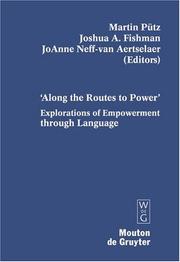
ISSN: 18610676 ISBN: 3110185997 9783110185997 3110923246 9783110923247 Year: 2006 Volume: 92 Publisher: Berlin New York Mouton de Gruyter
Abstract | Keywords | Export | Availability | Bookmark
 Loading...
Loading...Choose an application
- Reference Manager
- EndNote
- RefWorks (Direct export to RefWorks)
The present volume grew out of the 30th International LAUD Symposium, held on April 19-22, 2004 at the University of Koblenz-Landau in Landau, Germany. The conference, "Empowerment through Language", was centrally concerned with the concept of power and/or empowerment as observed in the status and use of language(s) and their speakers in bilingual and multilingual communities. The book discusses the theoretical issues inherent in the relation between language and power, the empowerment strategies involved in language policy and language planning situations, and the issue of language endangerment in Africa, i.e., the fate of minority languages and their speakers and the sociopolitical factors perpetuating their exclusion from access to knowledge and skills. The volume constitutes a collection of papers by prominent linguists from many countries who explore the exciting interdisciplinary area of language, power, and linguistic empowerment. Broadly speaking, the papers focus on the theoretical and sociolinguistic problems related to the role of power in language policy and language planning situations in multilingual settings, language choices, code switches, and associated topics. Thus, the aim of the volume is to open up language policy and language planning issues as observed in multilingual contexts (nations, institutions, other settings, and domains) to the wider community of critical sociolinguistics by concentrating on the relationship between language and power. More particularly, it offers a decidedly sociolinguistic perspective to the study of language and power, which likewise has been tackled from other perspectives in the areas of sociology and political science. This interdisciplinary relationship is important both for linguistics and for the sociology of language. In this way, the book is an important contribution to general linguistics, sociolinguistics, minority issues in multilingual settings as well as the social sciences. In honor of his upcoming 80th birthday (2006) , Fishman's colleagues and former students are preparing five volumes by him or about him, this being one of them.
Sociolinguistics --- Sociolinguistics. --- Power (Social sciences) --- Language policy. --- Language planning. --- Language and languages --- Planned language change --- Glottopolitics --- Institutional linguistics --- Language and state --- Languages, National --- Languages, Official --- National languages --- Official languages --- State and language --- Empowerment (Social sciences) --- Political power --- Language and society --- Society and language --- Sociology of language --- Planning --- Government policy --- Social aspects --- Sociological aspects --- Communication policy --- Language planning --- Exchange theory (Sociology) --- Political science --- Social sciences --- Sociology --- Consensus (Social sciences) --- Language and culture --- Linguistics --- Integrational linguistics (Oxford school) --- Language policy --- Langage. Sociologie. (Collection) --- Taal. Sociologie. (Reeks) --- intercultural communication. --- language planning.
| Listing 1 - 10 of 13 | << page >> |
Sort by
|

 Search
Search Feedback
Feedback About
About Help
Help News
News